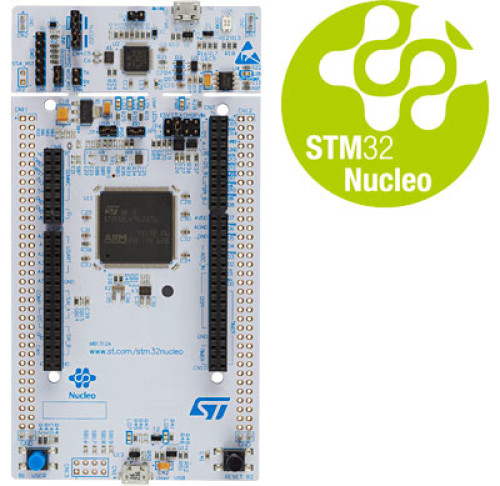

- #Stm32h7 nucleo install#
- #Stm32h7 nucleo upgrade#
- #Stm32h7 nucleo full#
- #Stm32h7 nucleo software#
- #Stm32h7 nucleo plus#
Cortex-M7F core can reach working frequency up to 480 MHz, while Cortex-M4F - up to 240 MHz. The STM32 H7-series is a group of high performance STM32 microcontrollers based on the ARM Cortex-M7F core with double-precision floating point unit and optional second Cortex-M4F core with single-precision floating point. STM32 H7 STM32 H7 series General information
#Stm32h7 nucleo plus#
The Cortex-M4F is conceptually a Cortex-M3 plus DSP and single-precision floating-point instructions. Each STM32 microcontroller series is based upon either a Cortex-M7F, Cortex-M4F, Cortex-M33, Cortex-M3, Cortex-M0+, or Cortex-M0 ARM processor core. The STM32 family consists of 17 series of microcontrollers: H7, F7, F4, F3, F2, F1, F0, G4, G0, L5, L4, L4+ L1, L0, U5, WL, WB.
In February 2021, ST announced the STM32U5 series, ultra-low-power MCUs based on the ARM Cortex-M33 core with a variety of low power and security features, such as TrustZone, Secure Boot, active IO tamper detection, hardware-based protection targeting PSA and SESIP assurance level 3, etc. #Stm32h7 nucleo install#
In October 2018, ST announced the STM32L5 series, ultra-low-power MCUs based on the ARM Cortex-M33 core with a variety of security features, such as TrustZone, Secure Boot, active IO tamper detection, Secure Firmware Install loader, certified cryptolib etc. #Stm32h7 nucleo upgrade#
In November 2017, ST announced the STM32L4+ series, an upgrade to the STM32L4 series Cortex-M4 MCUs. The device runs at 400 MHz and is produced using 40 nm technology. In October 2016, ST announced the STM32H7 series based on the ARM Cortex-M7F core. In September 2014, ST announced the STM32 F7 series, the first chips based on the Cortex-M7F core. A new NUCLEO-F302R8 board was also announced. #Stm32h7 nucleo full#
In April 2014, ST announced the STM32F30x chips are now available in full production. #Stm32h7 nucleo software#
In February 2014, ST announced the release of free STM32Cube software tool with graphical configurator and C code generator. In February 2014, ST announced multiple STM32 Nucleo boards with Arduino headers and mbed IDE. In February 2014, ST announced the STM32 L0-series chips based on the ARM Cortex-M0+ core. In January 2014, ST announced the STM32 F0x2-series chips, STM32F072B-DISCO board, and STM32072B-EVAL board. In December 2013, ST announced that it is joining the mbed project. In October 2013, ST announced the STM32F0308DISCOVERY board. In September 2013, ST announced the STM32F401C-DISCO and STM32F429I-DISCO boards. The STM32 F030-series will also be available in a TSSOP20 package. In July 2013, ST announced the STM32 F030-series chips. In April 2013, ST announced the STM32 F401-series chips. In February 2013, ST announced the STM32 F4x9-series chips. In February 2013, ST announced STM32 Embedded Coder support for MATLAB and Simulink. 
In January 2013, ST announced full Java support for STM32 F2 and F4-series chips. The STM32 F050-series will also be available in a TSSOP20 package. In September 2012, ST announced full-production of STM32 F3-series chips and STM32F3DISCOVERY board. In June 2012, ST announced the STM32 F3-series chips based on the ARM Cortex-M4F core. In May 2012, ST announced the STM32F0DISCOVERY board. In February 2012, ST announced the STM32 F0-series chips based on the ARM Cortex-M0 core. In September 2011, ST announced the STM32 F4-series chips based on the ARM Cortex-M4F core and STM32F4DISCOVERY board. In March 2011, ST announced the expansion of their STM32 L1-series chips with flash densities of 256 KB and 384 KB. In February 2011, ST announced the STM32L-DISCOVERY board. In November 2010, ST announced the STM32 F2-series chips based on the ARM Cortex-M3 core, and future development of chips based on the ARM Cortex-M4 and ARM Cortex-M3 cores. In September 2010, ST announced the STM32VLDISCOVERY board. In April 2010, ST announced the STM32 L1-series chips. In October 2009, ST announced that new ARM chips would be built using the 90 nm process. In November 2007, ST announced the low-cost "STM32-PerformanceStick" development kit in partner with Hitex. In June 2007, ST announced the STM32 F1-series based on the ARM Cortex-M3. In October 2006, STMicroelectronics (ST) announced that it licensed the ARM Cortex-M3 core.






 0 kommentar(er)
0 kommentar(er)
